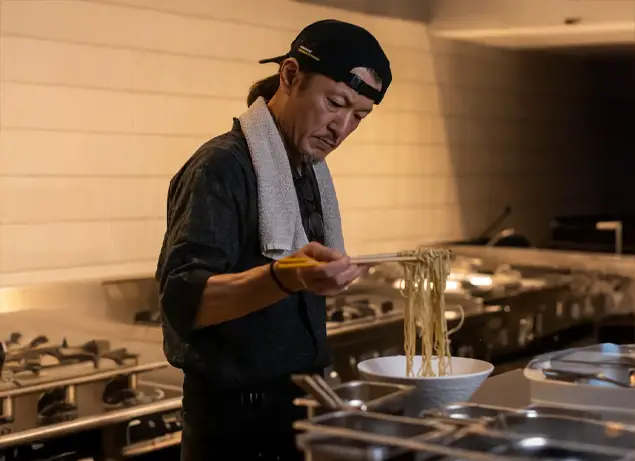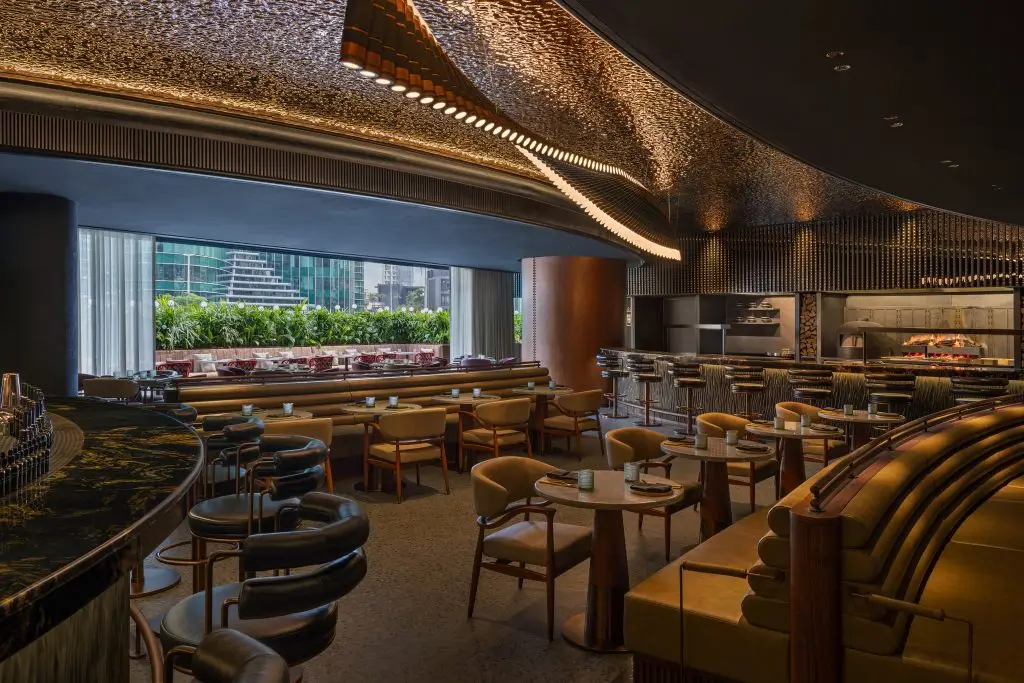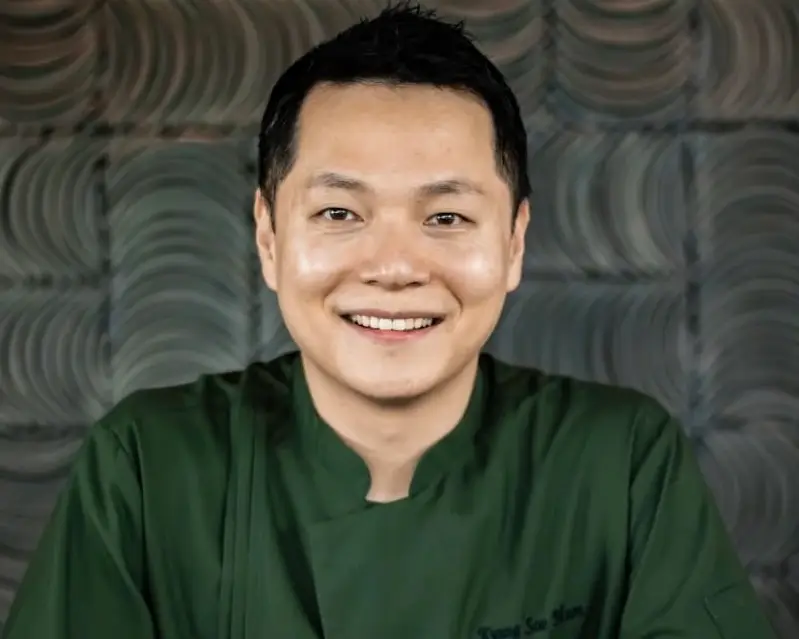
Dubai, UAE: One man’s struggle and a humble, eight-seat diner. This is how Konjiki Hototogisu began, in 2006, as Chef Atsushi Yamamoto’s first ramen venture in a quiet Shibuya alley.
In the early days, chef Yamamoto, just around 25 then, faced an enormous challenge. Sometimes, only five customers a day walked through the door.
He often sold household goods just to survive. But, chef Yamamoto’s resolve to stay in business and reach his goal to be the top ramen shop in Japan, drove him.
He was focused on creating a taste no one else could replicate. This commitment meant that on most days, he would work from early morning until midnight, mastering ingredients and making prototypes. The chef often slept on two chairs at the shop up to two times a week to keep learning.
His perseverance paid off. Nine years later, in 2015, his restaurant was awarded the Michelin Bib Gourmand.
It later received a Michelin Star from 2019 to 2023, a rare distinction. This made it one of only three ramen restaurants globally to achieve such a high distinction.
Today, chef Yamamoto runs two restaurants in Dubai too. His restaurant in Dubai’s Mall of the Emirates secured the Michelin Bib Gourmand for 2024 and 2025.
As he opens a second location on Palm Jumeirah, we spoke to the chef to know more about his journey to becoming a Michelin-recognised brand.
HOTELS OF UAE: Interview with Chef Atsushi Yamamoto
Question: You started Konjiki in 2006 with only eight seats in a quiet Shibuya alley. What was your experience in the initial years?
Chef Yamamoto: When we first opened, our ramen tasted very different from what it is today. In the early days, due to my limited experience, only five people walked through the door many days. I was trying to invent a new genre of ramen no one had seen before, but it was hard for people to understand or relate to it. I kept asking myself how I could make ramen that moves people emotionally. During that period I realised I needed to deepen my skills and expand my knowledge to earn people’s recognition. I began staying overnight at the shop to test, practice, and adapt. That same dedication still drives me today.
Question: What motivated you to become a chef and start a restaurant?
Chef Yamamoto: From age 20 to 26, I worked as a technician in the construction industry. I have always loved creating things. Around 24, I found myself deeply impressed by chefs. Whenever I treated myself to a meal after hard work, I would watch the chef in the kitchen. Sometimes in humble restaurants, I would see how people thanked them directly for delicious food. That direct gratitude moved me. I realised I wanted a life where people could express that thanks to me through the meals I create. I decided to become a chef.
Question: What year was the point when you felt customers finally started to regularly support the business?
Chef Yamamoto: I believe it was about three years after we opened that things began to shift. That was when we started seeing regular customers returning. Word of mouth began to spread. I felt that our concept was beginning to resonate.
Question: You spent years trying to create a taste no one else could copy. Was the biggest step toward your award-winning flavour the choice to use hamaguri clam stock or the addition of truffle and porcini oil?
Chef Yamamoto: Ingredients like hamaguri clam stock or aromatic truffle and porcini oil are certainly important. What matters most to me is originality, in other words, creating a truly unique flavour identity. I always challenge myself to combine special ingredients in unexpected ways. The taste becomes wholly ours. That constant pursuit of uniqueness leads to our award-winning character.
Question: Konjiki earned the Bib Gourmand from 2015 to 2018. How did that achievement feel?
Chef Yamamoto: When we received the Bib Gourmand, I was overjoyed. Ever since the first Michelin Guide Tokyo was published in 2008, I dreamed of having Konjiki recognised by Michelin. To see that recognition come true was deeply meaningful. It was not just for me but as validation for the team and for our approach to ramen.
Question: You often slept at your restaurant to keep testing recipes for years. What was the one core belief that kept you going when you struggled to attract customers?
Chef Yamamoto: Life was extremely tough in the early days. There were moments when I seriously considered closing. What sustained me was faith in our vision and my wife’s unwavering support. Her encouragement and belief in me gave me the confidence to push forward. I also believed that if I did not persevere, I would never know how far we could go.
Question: You recently opened your second Dubai branch on Palm Jumeirah. Since you always try to improve, what is one new ingredient or dish you created just for the Dubai market?
Chef Yamamoto: For our second Dubai location, we created two exclusive ramen dishes. We conceived their flavour profiles especially for this market.
Duck Soy Sauce Ramen: We blend three soups: duck, Japanese dashi, and clam. This achieves a broth with rich, layered umami. For toppings, one sauce combines black truffle aroma with pistachio flavour. Another is a homemade fig sauce. Diners experience evolving aromas and complexity with every bite.
Edamame and Herb Chicken Wonton Noodles: Our broth is a fusion of chicken stock, Japanese dashi, and edamame potage. This provides smokiness and depth. Topping sauces include a homemade basil sauce and a fermented fig sauce crafted with Japanese fermentation techniques to heighten umami. The wontons, made from edamame and chicken, add a light, savoury texture. As you eat, the sweet and sour umami from the fermented fig and fresh basil aroma enhance the experience.
Question: Konjiki has opened in several cities globally. Why did you choose Dubai as a location?
Chef Yamamoto: Dubai is now one of the world’s great global cities, alongside New York, London, and Paris. It is a crossroads of cultures, a major food destination, and a place where people appreciate craftsmanship and novelty. We saw it as the perfect stage for Konjiki’s ramen to engage with a cosmopolitan and adventurous audience.
Question: What are your future plans for Dubai, UAE, and GCC?
Chef Yamamoto: We plan to continue growing our presence in Dubai and Abu Dhabi. Then we will explore expansion into Saudi Arabia and other GCC countries. Over time, we hope to open multiple branches in key cities. We will maintain control over quality, innovation, and consistency.
Have a story or comments to share? Write to us at editor@hotelsofuae.com.



